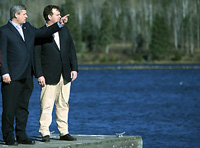
News |
- Canada's First Marine Conservation Area
- OlyWest Officially Off (Almost)
- Global CO2 Rising Faster Than Expected
- Clean Energy Standards = Benefits
- No Progress: Air, Water Quality or GHG Reductions
- Clean Air Act Lawsuit Against Top US Polluter
- Biofuels Hurt Food Prices, Water Quality and Supply
- NGOs Join Aboriginal Protesters
- Tembec Receives FSC Certification in Manitoba
- Protected Areas Standards Slipping: Status Report
- Alberta Transmission Line "Back to Square One"
- Al Gore and IPCC Share 2007 Nobel Peace Prize
| Canada's First Marine Conservation Area | 06 November 07 |
 The Governments of Canada and Ontario signed an historic agreement October 25, 2007 to establish the largest freshwater reserve in the world, on the largest lake in the world - Lake Superior. This will be Canada's first National Marine Conservation Area, protecting 1 million hectares of pristine islands, rugged coast, and crystal-clear water. The Governments of Canada and Ontario signed an historic agreement October 25, 2007 to establish the largest freshwater reserve in the world, on the largest lake in the world - Lake Superior. This will be Canada's first National Marine Conservation Area, protecting 1 million hectares of pristine islands, rugged coast, and crystal-clear water.The marine conservation area will protect a huge swath of Lake Superior from some activities, such as mining near the shoreline. Commercial fishing and shipping will, however, still be allowed. "It's a great day for peregrine falcons, eagles, osprey, bears, wolves, caribou and of course, those deep cold-water fish like lake trout, whitefish and walleye that school in the sparkling clear water unparalleled anywhere," said Monte Hummel, President Emeritus of WWF-Canada and one-time canoe guide in the area. "This is the kind of natural wonder that makes Canada the envy of the world, and we do well to protect it for future generations, everywhere." The announcement is culmination of a decade of negotiations among the Ontario government, Aboriginal leaders and local governments. View October 25, 2007 Prime Minister's Office press release View October 25, 2007 WWF Canada press release View WWF Canada webpage for Lake Superior National Marine Conservation Area View October 25, 2007 Canadian Press article on CTVNews.ca View October 25, 2007 Canadian Press article Sources: Government of Canada, WWF Canada, Canadian Press
|
|
| OlyWest Officially Off (Almost) | 29 October 07 |
 Hytek Ltd., remaining partner from the OlyWest group that had planned to build a pork-processing plant inside Winnipeg, has set its sights on Neepawa. Hytek Ltd., remaining partner from the OlyWest group that had planned to build a pork-processing plant inside Winnipeg, has set its sights on Neepawa.Hytek Ltd. announced October 11th it is buying Springhill Farms hog-kill plant in Neepawa, a town of 3,300 people, located 170 kilometres northwest of Winnipeg. If the purchase goes through, plans for a controversial $200-million plant in Winnipeg would be shelved and the proposal for OlyWest withdrawn, says Hytek vice-president Guy Baudry. The other two partners in the project, Olymel LP and Big Sky Farms Inc., announced their withdrawal from the Olywest project December 2006, blaming in part a moratorium Manitoba imposed on building new or expanding existing hog operations. Springhill Farms was founded in 1986 by the Hutterite Brethren. The plant shut down indefinitely in 2003, due to hard economic times in the pork industry, but re-opened later that year following a $3 million provincial loan. View October 12, 2007 CBC News article View October 13, 2007 Manitoba Cooperator article View October 13, 2007 Winnipeg Sun article View 2006 Manitoba Wildlands news items about OlyWest: December 7, November 21, November 17, October 13, September 14, July 20, May 1, 2006 Sources: CBC News, Manitoba Cooperator
|
|
| Global CO2 Rising Faster Than Expected | 29 October 07 |
 Carbon dioxide (CO2) levels in the atmosphere have risen faster than expected since 2000, says a new study by the Global Carbon Project, University of East Anglia, UK, and the British Antarctic Survey. Carbon dioxide emissions were 35 percent higher in 2006 than in 1990, a much faster growth rate than anticipated. Carbon dioxide (CO2) levels in the atmosphere have risen faster than expected since 2000, says a new study by the Global Carbon Project, University of East Anglia, UK, and the British Antarctic Survey. Carbon dioxide emissions were 35 percent higher in 2006 than in 1990, a much faster growth rate than anticipated.The authors analyzed atmospheric CO2 observations and CO2 emissions data since 1959 and compared both observed and projected trends. The team of international scientists found that inefficiency in the use of fossil fuels increased levels of CO2 by 17 percent. The other 18 percent increase came from a decline in the natural ability of land and oceans to soak up CO2 from the atmosphere. Traditionally, about half of the emissions resulting from human activity are absorbed by natural "sinks" but efficiency of these sinks has fallen, the study suggests. The study also states that global CO2 emissions were up to 9.9 billion tons of carbon in 2006, 35 percent above emissions in 1990 (reference year in Kyoto Protocol). The changes "characterize a carbon cycle that is generating stronger-than-expected and sooner-than-expected climate forcing". View October 23, 2007 Reuters article on Planet Ark View October 23, 2007 Science Daily article View October 23, 2007 BBC News article View October 23, 2007 Associated Press article View Carbon Trends webpage of the Global Carbon Project Sources: BBC News, Science Daily, Associated Press, Global Carbon Project
|
|
| Clean Energy Standards = Benefits | 29 October 07 |
 Standards for renewable energy in US states are cutting pollution, saving money, creating jobs, and fueling a clean energy boom in all 25 U.S. states with such standards. Standards for renewable energy in US states are cutting pollution, saving money, creating jobs, and fueling a clean energy boom in all 25 U.S. states with such standards.The US Public Interest Research Group (US PIRG) report, "Reaping the Rewards," documents benefits achieved by states with renewable electricity standards (RES). The report also calls on the US Congress to establish a national renewable electricity standard and suggests at least 25 percent of America's electricity should come from new renewable sources by 2025. In 2007, more than 70 percent of planned renewable energy is expected to be built in states with RES standards. Some other findings:
View Environment Michigan report, Reaping the Rewards: How State Renewable Electricity Standards Are Cutting Pollution, Saving Money, Creating Jobs And Fueling A Clean Energy Boom Source: Environmental News Service
|
|
| No Progress: Air, Water Quality or GHG Reductions | 29 October 07 |
 Canada is failing to make real progress on improving air and water quality or reducing greenhouse gas (GHG) emissions. Canada is failing to make real progress on improving air and water quality or reducing greenhouse gas (GHG) emissions. The third annual report by the federal government on indicators of environmental sustainability came to this conclusion based on the latest available data on air and water quality and GHG emissions. The reason? All of us. "The growing population... coupled with economic growth, led to greater resource use and waste production, increased greenhouse gas emissions and, in certain cases, more air and water pollution." The report, prepared by Environment Canada, Statistics Canada and Health Canada, demonstrates why the Canadian government's latest climate control plan may not be effective in achieving actual reductions in Canada's overall GHG emissions. Under the plan, GHG emissions can still rise - as long as the increase does not outstrip the rate of economic growth. View October 16, 2007 Toronto Star article View October 15, 2007 Environment Canada report, Statistics Canada and Health Canada, Canadian Environmental Sustainability Indicators: Highlights Source: Toronto Star
|
|
| Clean Air Act Lawsuit Against Top US Polluter | 23 October 07 |
 One of the largest US electric utilities has agreed to spend $4.6 billion to reduce harmful air emissions from 16 coal-fired power plants, ending an eight-year legal battle over alleged violations of the federal Clean Air Act. One of the largest US electric utilities has agreed to spend $4.6 billion to reduce harmful air emissions from 16 coal-fired power plants, ending an eight-year legal battle over alleged violations of the federal Clean Air Act.The historic settlement with American Electric Power (AEP) was made public October 9, 2007 and will dramatically improve air quality in the eastern US. The federal Environmental Protection Agency (EPA), eight states and 14 citizen groups (including NRDC and Sierra Club US) filed suit against the AEP in 1999, accusing the company of making major modifications to nine power plants without acquiring proper permits and or installing new pollution controls, resulting in increased smog and soot pollution. In settling the suit, AEP will not admit any wrongdoing, but in addition to the pollution control measures, AEP will pay a $15 million civil penalty and fund $60 million in environmental mitigation projects. AEP owns 25 coal-fired electric plants and was the number one industrial emitter of carbon dioxide, nitrogen oxides and sulfur dioxide pollution in the US, based on 2004 data. View October 9, 2007 Environmental News Service article View October 9, 2007 Washington Post article View October 9, 2007 Natural Resources Defense Council (NRDC) press release View October 11, 2007 Washington Post article Sources: Environmental News Service, Washington Post, Natural Resources Defense Council
|
|
| Biofuels Hurt Food Prices, Water Quality and Supply | 23 October 07 |
 Scientists, researchers and economists are warning the production of biofuels could undermine food output, drive up food prices, create water shortages, and impact water quality. Scientists, researchers and economists are warning the production of biofuels could undermine food output, drive up food prices, create water shortages, and impact water quality.An International Water Management Institute report examines China and India's plans to increase biofuel production from irrigated maize and sugarcane. The report indicates biofuels will require large quantities of water, and increase demand for land at the expense of nature. In its twice-yearly report on the world economy, the International Monetary Fund warns that an increasing global reliance on grain as a source of 'fuel' could drive up food prices in poor countries. It called for international coordination to ensure that promoting biofuels takes account of impacts on consumer prices. A new US National Research Council report says if ethanol production continues to rise, the effect on water quality and water supply could be considerable. Increased pressure on local aquifers used to grow and refine corn into ethanol; high levels of nitrogen in groundwater from pesticides and fertilizers; and runoff pollution in streams and rivers are a few potential impacts. Regional water assessments, adoption of environmentally sound farming practices, and full life cycle of biofuel production reviews are necessary before conversion to biofuel cultivation, according to the report. View October 11, 2007 Reuters article View International Water Management Institute research on biofuels View October 17, 2007 article on Forbes.com View October 2007 International Monetary Fund report, World Economic Outlook View October 1, 2007 MIT News article View October 10, 2007 National Research Council press release View National Research Council report Sources: Reuters, International Water Management Institute, Forbes.com, International Monetary Fund, National Research Council
|
|
| NGOs Join Aboriginal Protesters | 23 October 07 |
 Royal Dutch Shell's plan to turn BC's 'Sacred Headwaters' into a coalbed methane gas field with wells, pipelines and roads is meeting with significant opposition from Tahltan First Nations Elders, concerned citizens, and NGOs. Royal Dutch Shell's plan to turn BC's 'Sacred Headwaters' into a coalbed methane gas field with wells, pipelines and roads is meeting with significant opposition from Tahltan First Nations Elders, concerned citizens, and NGOs. The Sacred Headwaters is a vast alpine basin, the shared birthplace of the Skeena, Nass and Stikine Rivers. The Tahltan First Nations have hunted and trapped in the Sacred Headwaters for millennia. The Elders opposing Shell insist they are not opposed to development, but they believe it should be guided by two principles: only one development at a time, and no development in the Sacred Headwaters. In August 2007, members of the Tahltan blockaded the main access road to the Sacred Headwaters, preventing Shell from resuming its drilling program. Fourteen groups sent a letter to the CEO and Chairman of Royal Dutch Shell informing them they "strongly oppose drilling for coalbed methane in the Sacred Headwaters and advise Shell to refrain from any activity in this area." NGOs also placed an ad in the September 11 edition of the Financial Times of London with the intention of garnering negative media attention for the company. Shell is planning to move ahead with drilling and proceed with its previously adjourned injunction application regarding access for drilling. Visit website of the Klabona Keepers Elders Society View October 8, 2007 Globe and Mail article by Wade Davis of National Geographic Society on Dogwood Initiative website Visit Sacred Headwaters website View September 11, 2007 NGO press release Visit Skeena Watershed Conservation Coalition website View Manitoba Wildlands' September 2005 news item Sources: Klabona Keepers Elders Society, Dogwood Initiative, Sacred Headwaters
|
|
| Tembec Receives FSC Certification in Manitoba | 23 October 07 |
|
The 900,000-hectare public forest license near Pine Falls is the first forest in Manitoba to be audited and certified in accordance with the FSC National Boreal Standard. Tembec received its certification from Rainforest Alliance's SmartWood program, an FSC-accredited certifier. An in-depth audit process first ensures the Company's forest management practices comply with FSC's rigorous standards for environmentally and socially responsible forestry practices. With FML 1 in Manitoba, Tembec and its partners now manage a 9.7 million hectare network of FSC certified forests in Canada. The network includes twelve FSC certified managed forests in four Canadian provinces. View October 10, 2007 Tembec press release Visit Tembec Manitoba website Visit Forest Stewardship Council Canada website Source: Tembec
|
|
| Protected Areas Standards Slipping: Status Report | 18 October 07 |
 In the 1990s, Manitoba led the way in Canada for its action to protect the largest proportion of its lands from development - 5.5 million ha protected by 2000. Today, according to Manitoba Wildlands' article in EcoJournal, the establishment of protected areas has slowed and protection standards - embedded in Manitoba public policy since 1990 through legislation, regulation, and national reporting - appear to be at risk. In the 1990s, Manitoba led the way in Canada for its action to protect the largest proportion of its lands from development - 5.5 million ha protected by 2000. Today, according to Manitoba Wildlands' article in EcoJournal, the establishment of protected areas has slowed and protection standards - embedded in Manitoba public policy since 1990 through legislation, regulation, and national reporting - appear to be at risk.Manitoba Conservation's web site currently confirms essential standard for protection, stating that "At a minimum, protected areas prohibit, through legal means, logging, mining (including aggregate extraction), and oil, petroleum, natural gas or hydro-electric development." However, this year the government has failed to uphold essential standards: announcement of a completed action - that can be verified. Protected areas announced this year do not have protection from mining activity in place. Manitoba is also dragging its feet on commitments to protect lands at the request of First Nations. During the spring 2007 election, Premier Gary Doer made renewed commitments for protected areas in Manitoba boreal regions, personally endorsed the east side World Heritage Site and personally committed to permanently protect Poplar River Park Reserve No action on these commitments is evident. On the positive side, there is time for the Manitoba government to clean up its protected areas regulations, and confirm its protection standards before this year's Protected Areas Grade - to be released by Manitoba Wildlands later this fall. "We have all kinds of protected areas announcements this year that are not protected, but there is time to fix these before the annual grade," said Gaile Whelan Enns, director of Manitoba Wildlands. View the Manitoba Wildlands article in Volume 17, No. 4 of Manitoba Eco-Network's Eco-Journal for September/October 2007 Source: Manitoba Wildlands, EcoJournal
|
|
| Alberta Transmission Line "Back to Square One" | 17 October 07 |
 Alberta's Energy and Utilities Board (EUB) has scrapped its scandal-plagued hearings into a proposed 500-kilovolt power transmission line between Edmonton and Calgary. Alberta's Energy and Utilities Board (EUB) has scrapped its scandal-plagued hearings into a proposed 500-kilovolt power transmission line between Edmonton and Calgary.The step was announced October 1 by the new EUB chair William Tilleman. The decision followed four investigations into how the energy board handled application by AltaLink to build the power line. Tilleman said the only way to restore public confidence in the provincial regulator is by going "back to Square One" and start the process from the beginning. He characterized the previous EUB decision as "the equivalent of a mistrial". New applications for the line will have to be filed, a public hearing will be held, and a new EUB panel will decide whether the line is needed. The EUB has been beleaguered by controversy following revelations that it hired private investigators to spy on landowners opposing the power line. One investigator also listened in on a landowners' conference call. Tilleman was appointed EUB chair in September 2007, as a result of the scandal. The provincial privacy commissioner, the ombudsman and a retired justice acting on behalf of the energy minister are already investigating the EUB hearings. The province's auditor general also agreed to look into conflict-of-interest allegations made by the Alberta NDP related to the wife of a senior Alberta energy official who works for AltaLink. View October 2, 2007 Edmonton Sun article View October 1, 2007 CBC News article View October 1, 2007 Calgary Herald article View October 1, 2007 CanWest News Service article on Canada.com View September 18, 2007 Financial Post article Visit Alberta's Energy and Utilities Board website Sources: CBC News, Calgary Herald, CanWest News Service
|
|
| Al Gore and IPCC Share 2007 Nobel Peace Prize | 17 October 07 |
 Climate change campaigner Al Gore and the UN Intergovernmental Panel on Climate Change (IPCC) have been awarded the 2007 Nobel Peace Prize. Climate change campaigner Al Gore and the UN Intergovernmental Panel on Climate Change (IPCC) have been awarded the 2007 Nobel Peace Prize.The prestigious prize was awarded October 12th "for efforts to build up and disseminate greater knowledge about man-made climate change, and to lay the foundations for the measures needed to counteract such change". The Norwegian Nobel Committee said it wanted to bring into sharper focus the "increased danger of violent conflicts and wars, within and between states" posed by climate change. The IPCC was selected because, "[t]hrough the scientific reports it has issued over the past two decades, the IPCC has created an ever-broader informed consensus about the connection between human activities and global warming. Thousands of scientists and officials from over one hundred countries have collaborated to achieve greater certainty as to the scale of the warming." Gore is characterized in the Nobel Committee press release as "probably the single individual who has done most to create greater worldwide understanding of the measures that need to be adopted." Gore was quoted as saying he was "deeply honoured" to receive the prize, while IPCC chairman Rajendra Pachauri said he was "overwhelmed" by the award. View Environment News Network October 14, 2007 article View October 12, 2007 Associated Press article in the New York Times View October 12, 2007 BBC News article View October 12, 2007 Norwegian Nobel Committee press release Visit 2007 Nobel Peace Prize webpage Sources: Norwegian Nobel Committee, BBC News, Associated Press
|
|


 RSS Feeds:
RSS Feeds: